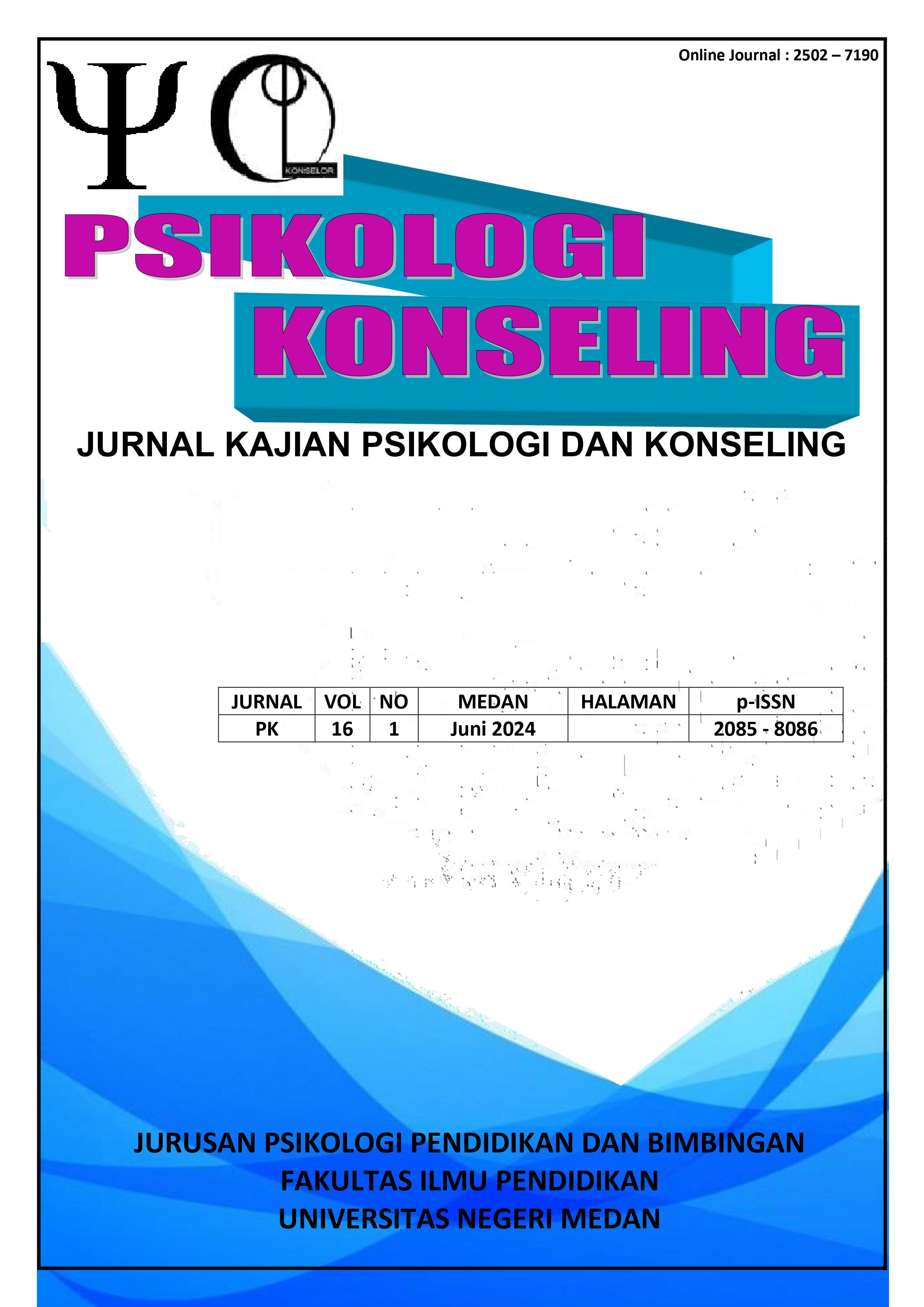PENGARUH WORK-LIFE BALANCE TERHADAP KINERJA PADA KARYAWAN PT X
DOI:
https://doi.org/10.24114/konseling.v16i1.60177Keywords:
Productivity, Company, Work-life Balance, Employee PerformanceAbstract
High productivity is expected to produce efficient and effective work. High productivity is needed for companies whose focus is producing goods, PT X is one of the companies whose focus is producing SIM Card and vouchers. In measuring success, human resources are the main factor that ensures the sustainability of the organization. One of the most important issues related to human resources is performance, performance is a reference for every company or organization to evaluate the continuity in achieving the goals of the company or organization. So that the easier it is for the company to achieve its goals, the better the performance of the employees there and vice versa. Work-life balance is one of the factors that can affect employee performance. This research approach uses quantitative methods as a research method with participants totaling 205 employees. The Work-life Balance Scale and Individual Work Performance Questionnaire (IPWQ) measuring instruments were used in this study. The data analysis process uses the IBM SPSS Statistic 25.0 application to test descriptive statistics of respondents and descriptive variables, validity test (R), reliability test (α), and linear regression test/hypothesis test (T). The results obtained work-life balance has an effect of 6.8% on employee performance, with a sig value of 0.000 <0.05.References
Adhisty, S. P., Fauzi, A., Simorangkir, A., Dwiyanti, F., Patricia, H. C., & Madani, V. K. (2022). Faktor-Faktor yang Mempengaruhi Kinerja Karyawan: Stress Kerja, Beban Kerja dan Lingkungan Kerja (Literature Review MSDM). JURNAL MANAJEMEN PENDIDIKAN DAN ILMU SOSIAL, 4(1), 134“148. https://doi.org/doi.org/10.38035/jmpis.v4i1
Alpian, M. (2024). Pengaruh dukungan sosial terhadap kinerja yang dimoderatori oleh Quarter-Life Crisis [Skripsi, UIN Sunan Gunung Djati Bandung]. digilib.uinsgd.ac.id/id/eprint/85076
Campbell, J. P., & Wiernik, B. M. (2015). The Modeling and Assessment of Work Performance. Annual Review of Organizational Psychology and Organizational Behavior, 2(1), 47“74. https://doi.org/10.1146/annurev-orgpsych-032414-111427
Delecta, P. (2011). Work Life Balance. International Journal of Current Research, 3(4), 186“189.
Faeni, D. P., Puspitaningtyas, R., & Safitra, R. (2021). Work Life Balance, Peningkatan Karir dan Tekanan Kerja terhadap Produktivitas: Kasus pada Lembaga Sertifikasi Profesi P3 Pembangun Penyuluh Integritas Bangsa. Studi Akuntansi, Keuangan, Dan Manajemen, 1(1), 45“57. https://doi.org/10.35912/sakman.v1i1.602
Fisher, G. G., Bulger, C. A., & Smith, C. S. (2009). Beyond work and family: A measure of work/nonwork interference and enhancement. Journal of Occupational Health Psychology, 14(4), 441“456. https://doi.org/10.1037/a0016737
Hariansyah, R., Rahmat, A., & Seswandi, A. (2023). Efek Mediasi Work Life Balance (WLB) Dalam Hubungan Antara Budaya Organisasi Dan Turnover Intention. Jurnal Komunitas Sains Manajemen, 2(1). https://doi.org/doi.org/10.55356/jksm.v2i1.80
Hasbi, A. (2020). Pengaruh Knowledge Management terhadap Pengembangan Sumber Daya Manusia dan Kinerja Karyawan Perhotelan di Sulawesi Selatan. Jurnal Kawistara, 10(2), 199. https://doi.org/10.22146/kawistara.56756
Hasugian, G. A., Santati, P., & Farla, W. (2023). Hubungan Antara Work-Life Balance Dengan Kinerja Karyawan Pada PT Kurnia Ciptamoda Gemilang. JAMBURA: Jurnal Ilmiah Manajemen Dan Bisnis, 6(1), 318“325.
Hendra, D., & Artha, B. (2023). Work- Life Balance: Suatu Studi Literatur. Innovative: Journal Of Social Science Research, 3(3), 11320“11330. https://doi.org/doi.org/10.31004/innovative.v3i3.3636
Irsyad, F., Hendriani, S., & Putro, S. (2022). Analisis Pengaruh Budaya
Organisasi, Kepemimpinan Dan Work Life Balance Terhadap Kinerja Pegawai Kantor Perwakilan Bank Indonesia Provinsi Riau. Jurnal Pendidikan Tambusai, 5(3), 10992“11000. https://doi.org/doi.org/10.31004/jptam.v5i3.2739
Jayanti, K. T., & Wati, L. N. (2020). PENGARUH GAYA KEPEMIMPINAN TERHADAP KINERJA KARYAWAN DAN DAMPAKNYA TERHADAP LOYALITAS KARYAWAN. Jurnal Ekobis : Ekonomi Bisnis & Manajemen, 9(1), 71“88. https://doi.org/10.37932/j.e.v9i1.51
Kasman, P. S. P. (2021). FAKTOR- FAKTOR YANG MEMPENGARUHI KINERJA BANK SYARIAH INDONESIA: PEMBERDAYAAN SUMBER DAYA MANUSIA, MOTIVASI KERJA DAN PERUBAHAN ORGANISASI (Literature Review Manajemen). JURNAL MANAJEMEN PENDIDIKAN DAN ILMU SOSIAL, 2(2), 689“696. https://doi.org/10.38035/jmpis.v2i2.625
Kithae, Paul, P., & Keino, D. C. (2016). Effects of Work Life Balance on Staff Performance in the Telecommunication Sector in Kenya. Archives of Business Research, 4(1). https://doi.org/10.14738/abr.41.1747
Koopmans, L., Bernaards, C., Hildebrandt, V., van Buuren, S., van der Beek, A. J., & de Vet, H. C. W. (2012). Development of an individual work performance questionnaire. International Journal of Productivity and Performance Management, 62(1), 6“28. https://doi.org/10.1108/17410401311285273
Latief, A., Rosalina, D., & Apiska, D. (2019). Analisis Hubungan Antar Manusia terhadap Kinerja Karyawan. Journal of Education, Humaniora and Social Sciences (JEHSS), 1(3), 127“131. https://doi.org/10.34007/jehss.v1i3.34
Mathis, & Jackson. (2006). Human Resource Management: Manajemen Sumber Daya Manusia. Salemba Empat.
Nadapdap, B. F., & Harahap, K. (2023). PENGARUH WORK-LIFE BALANCE DAN LINGKUNGAN KERJA TERHADAP KINERJA KARYAWAN. TRANSEKONOMIKA: AKUNTANSI, BISNIS DAN KEUANGAN, 3(5), 827“842. https://doi.org/10.55047/transekonomika.v3i5.523
Pusparani, M. (2021). FAKTOR YANG MEMPENGARUHI KINERJA PEGAWAI (SUATU KAJIAN STUDI LITERATUR MANAJEMEN SUMBER DAYA MANUSIA). Jurnal Ilmu Manajemen Terapan, 2(4), 534“543. https://doi.org/10.31933/jimt.v2i4.466
Ramya, R. (2014). Work Life Balance Strategies of Women. International Journal of Research and Development - A Management Review , 21“26.
Rizqiyah, J. (2024). Pengaruh Keseimbangan Kehidupan Kerja (Work Life Balance) Sebagai Faktor Yang Mempengaruhi Kinerja Karyawan. AGILITY: Lentera Manajemen Sumber Daya Manusia, 2(01), 15“20. https://doi.org/10.59422/lmsdm.v2i01.277
Widyastuti, T., & Hidayat, R. (2018). Adaptation of Individual Work Performance Questionnaire (IWPQ) into Bahasa Indonesia. International Journal of Research Studies in Psychology, 7(2). https://doi.org/10.5861/ijrsp.2018.3020
Wirawan, R. P. E. (2022). PENGARUH BEBAN KERJA TERHADAP STRES KERJA MELALUI WORK LIFE BALANCE. SIBATIK JOURNAL: Jurnal Ilmiah Bidang Sosial, Ekonomi, Budaya, Teknologi, Dan Pendidikan, 1(10), 2169“2180. https://doi.org/10.54443/sibatik.v1i10.319
Wiyarta, J. B., Susita, D., & H, A. W. (2023). PENGARUH SEMANGAT KERJA DAN KESEIMBANGAN KEHIDUPAN KERJA (WORK LIFE BALANCE) TERHADAP KINERJA KARYAWAN DALAM MENCAPAI TARGET OKR (OBJECTIVE AND KEY RESULTS): (Studi Pada PT. Grab Teknologi Indonesia Regional Yogyakarta dan Jawa Tengah). Neraca: Jurnal Ekonomi, Manajemen Dan Akuntansi, 1(5), 585“596. https://doi.org/doi.org/10.572349/neraca.v1i5.622
Downloads
Published
How to Cite
Issue
Section
License
Copyright (c) 2024 Dea Putri Widyastuti, Reza Fahlevi, Debora Basaria

This work is licensed under a Creative Commons Attribution-ShareAlike 4.0 International License.
This work is licensed under a Creative Commons Attribution-ShareAlike 4.0 International License.




